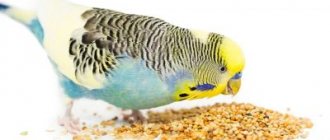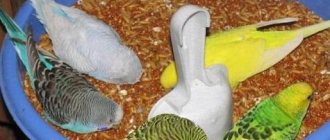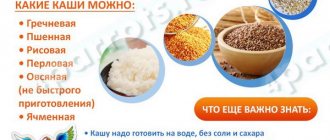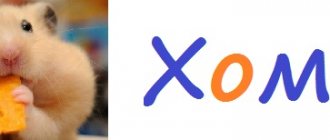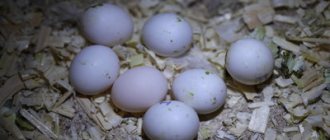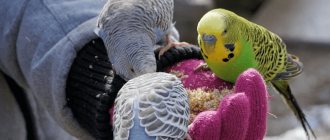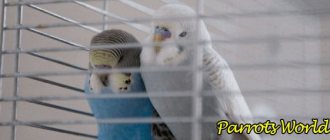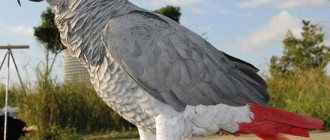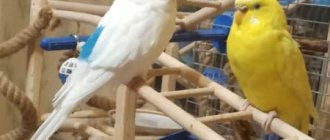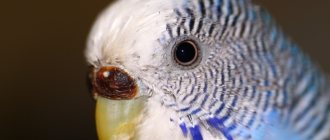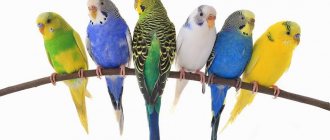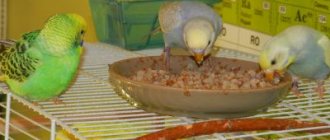Basic diet of budgerigars
Australia, a continent with a warm and even hot climate, is considered the birthplace of budgerigars. Here, about 40 species of plants are suitable for feeding birds, including leaves of trees and shrubs, as well as all the cereals growing there. Obviously, the best food for budgies should be as close as possible to the menu to which they are genetically adapted. The optimal solution in this case would be food that contains important grains for them: millet, oats, buckwheat, wheat, rice, crushed corn, sunflower seeds, as well as flax and various herbs. Many people try to prepare such mixtures on their own, but it is important to know that all components in this case must be mixed in strictly defined proportions using measuring spoons and glasses. In ready-made feeds, the necessary cereals are present in the required quantities.
Soft food
Often, for better absorption of feed, wheat, oats and millet are pre-sprouted. At the same time, the vitamin composition of cereals also increases. You can give budgies boiled millet, brown rice, buckwheat, corn grits, oats, soybeans, lentils, beans, pearl barley, barley and other cereals. Porridges are cooked in water, without any additives. It is advisable not to overcook the grains so that the structure of the feed is crumbly. Sprouted and boiled cereals quickly deteriorate, so leaving such food in the feeder for a long time is not recommended.
How to diversify your budgie's menu
Grain food alone may not be enough for small feathered pets, and this is primarily due to the fact that they can quickly get bored with a monotonous diet, and this, in turn, leads to a decrease in appetite. It is also very important to provide the bird with a complete complex of vitamins and minerals, and this is only possible if the menu is sufficiently diverse. So, what else can you pamper your parrot with?
Sprouted feed
Sprouted seeds of buckwheat, oats and wheat contain fiber and vitamins that can provide the budgie with extremely important energy and protect against vitamin deficiency. The shelf life of such feeds in the refrigerator is only two days, so it is worth sprouting them in small portions and not giving the bird overcooked sprouts.
Fruits
Berries and fruits are the key type of succulent food that parrots need. However, not all fruits are suitable for them. On the list approved by veterinarians today:
- stone fruits (plums, apricots, peaches, cherries);
- melons (watermelons, melons);
- citrus;
- apples and pears;
- grape;
- kiwi;
- forest and garden berries.
It is necessary to give such treats to the bird in small portions and only in washed and peeled form. You can also include dried berries and fruits in your diet.
Vegetables
Vegetables are a real storehouse of minerals and vitamins, so adding them to the diet in small quantities will have a beneficial effect on the health of your parrot. The list of vegetables most preferred by birds includes:
- pumpkin (cucumbers, zucchini);
- legumes (beans, green peas);
- some nightshades (tomatoes, bell peppers);
- leaf salad;
- root vegetables (carrots, turnips, beets);
- corn.
Vegetables prepared for a parrot should be ripe, and corn should be of milky maturity. However, it is not necessary to clear them of seeds.
Grass and greenery
Including greenery and small twigs in the budgerigars’ menu is a must, as with their help they not only receive more nutrients, but can also quickly drain and clean their beak. As for branches, the birds can be offered resin-free and scalded shoots of birch, linden, maple, chestnut, ash, alder or beech, cut in ecologically clean areas. You can grow grass for your pet yourself from special mixtures. Only in this case can you be sure that it does not contain harmful components and parasites; moreover, such mixtures include the most beneficial plants for parrots, for example, Grass for your pets from AVZ.
Greenery
The diet of the winged friend also includes green food. The budgie eats lettuce leaves, some trees and even ordinary grass. This food contains a lot of fiber and substances that are beneficial for the immune system.
Healthy greens include: all types of cabbage, carrot and beet tops, dandelions, clover, spinach, radish tops, chicory leaves, plantain. The leaves should be washed well in water, as bird parasites can settle on them. The greens should be fresh; it is better not to offer them to the parrot if they are withered or stale.
Under no circumstances should you give: tops of tomatoes, eggplants, potatoes. Also prohibited are laurel, spurge, dill, and basil. Store-bought flowers are impregnated with a special composition, thanks to which they last longer. Such flowers should not be given to a parrot.
Vitamin complexes and mineral mixtures for budgies
Due to anatomical features, such as the presence of a goiter, birds need gastroliths, i.e. sand and small pebbles. Also, the diet should contain certain minerals, such as sulfur, phosphorus, calcium, magnesium, iron. In pet stores you can buy special mineral stones, as well as chalk and sepia. It is not recommended to give vitamin complexes to children on purpose, since there is a very high risk of incorrectly calculating the dose. However, with the first renewal of plumage, it is necessary to maintain the balance of nutrients in the parrot’s body. To do this, you can give him vitamin solutions that will help shorten the molting period and quickly restore feather cover. There are also special preparations for normalizing metabolism and treating stress, and compositions to support the vital functions of birds during the period of bearing and raising chicks. You should not neglect them, because these are the drugs that help pets get through difficult periods without serious health consequences. For example, you can give your pet the combined multivitamin complex Radostin® Vitasil. It contains vitamin A, D3 and E. The components have a synergistic effect, which is expressed in increasing the body's resistance, normalizing metabolism, stimulating development, growth and productivity, especially during egg laying and feeding chicks. Attention! It is very important to strictly adhere to the dose and change the water with dissolved vitamins every day!
Other
You can supplement the menu of your favorite pets with wheat, millet, and oats. If the question arises about whether it is possible to give a parrot a watermelon, then it is preferable to give one grown in a local melon at the end of summer. Parrots also love Chinese cabbage. It is not recommended to give celery.
The digestive system of parrots easily copes with the digestion of grains, young bark, herbs, and vegetables. By introducing foods that are allowed for them into the diet, the owner ensures good health and excellent mood.
Next
NutritionHow long can a parrot live without food and water?
Water for a budgie
Parrots need to drink regularly, since clean water helps to secrete gastric juice in the right quantities and promotes complete and healthy digestion. Lack of fluid can lead to poor absorption of nutrients from feed, insufficient saturation of organs and tissues with oxygen and, as a result, to serious diseases. That is why attention to the bird’s drinking bowl should be no less than to the contents of the feeder. Veterinarians recommend giving budgies bottled water intended for children - only in this case can you be sure of its safety, purity and sterility. Mineral and carbonated water, even from large, reputable manufacturers, is strictly contraindicated for birds, as it contains compounds hazardous to health. The water needs to be changed daily and the drinking bowl washed.
What products are prohibited?
There are some foods that should not be given to budgies, otherwise it can lead to illness or death of the bird.
These include:
- Salt . Birds simply cannot process this spice, so even a small amount of salt can lead to dehydration and death.
- Spices or herbs . They cause diseases and other health problems. Excessive consumption of any seasoning causes the instant death of the wavy.
- Milk or dairy products . To digest milk, the body must have special enzymes that are absent in birds. Such products additionally contain a lot of fat. The only exception is low-fat cottage cheese.
- Mushrooms . They negatively affect the digestive system of birds.
- Chocolate products . They contain cocoa as well as large amounts of sugar. These components excite the nervous system of birds.
- Potatoes, eggplants or radishes. They are difficult for birds to digest and also do not bring any benefit to the body.
It is necessary to tell all family members about the optimal diet in order to prevent a situation where a child or an elderly person feeds a bird with prohibited foods.
How to feed a sick budgie
Unfortunately, birds are not immune from diseases, and during the period of treatment and recovery, feathered pets require special care and, of course, special nutrition. As a rule, at this time the birds are too weak to peck at the usual grain food, so you need to take care of the menu for your pet separately. During illness, veterinarians most often suggest switching the parrot to liquid porridge, which you can prepare yourself in a blender. The finished mixture must be given to the bird from a syringe at least 3 times a day, and the portion should not be more than 1.5 ml. If the bird can eat on its own, it is better to offer it a mixture of millet, buckwheat and crushed wheat groats, boiled until half cooked. For diarrhea, rice porridge is recommended. A varied diet, only fresh foods and mineral supplements - all this will allow your parrot to remain cheerful and healthy throughout his life. It is also worth regularly consulting with a veterinarian about your pet’s diet in order to develop the most healthy and tasty menu for him.
Daily diet
Having figured out what else budgerigars eat besides food at home, breeders are wondering how to organize feeding. It is known that the basis of the diet is grain feed. You need two teaspoons of them per day. Using only grain feed is harmful to your pet, and therefore half of the daily menu is taken up by greens, fruits and vegetables.
To properly feed your parrot, you should follow simple rules:
- do not give the daily portion at a time;
- using only fresh products. Those not eaten during the day are removed in the evening;
- constant availability of fresh water near the feeder.
In addition, it is worth considering that if for some unknown reason the “wavy” refuses grain feed, it must be replaced with something else.
Twigs
Some owners of feathered pets recommend adding thin tree branches to the diet. They are not entirely correctly classified as food, since the parrot mainly sharpens its beak on them and cleans its claws on its paws. But, since at the same time he swallows particles of bark and wood, you should make sure that such food is useful to him.
You can give budgies thin branches of maple, aspen, linden, and various fruit trees, such as apple or plum trees. You can give twigs of nut trees, but they need to be removed from leaves, which contain tannins.
You should not offer oak, pear, acacia, lilac, or bird cherry to your winged friend. The substances in these branches are dangerous for your pet. You need to be careful with conifers: they can be given a little at a time if they are cleared of resin.
